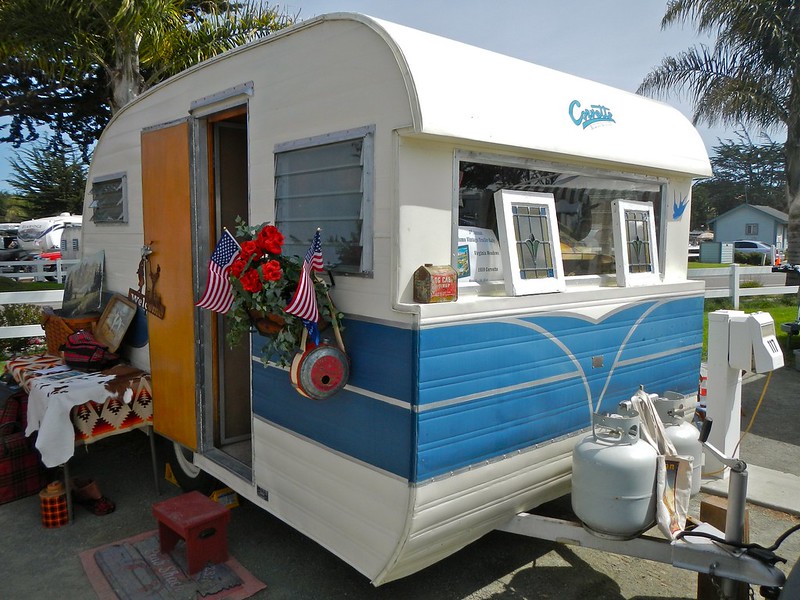
Towing an RV with a truck can be a daunting task, but it’s not impossible. There are a few things you need to know to make the process smoother and safer.
First, you need to know your truck’s towing capacity. This information can be found in your truck’s owner manual or by contacting the manufacturer. Select an RV that falls within your vehicle’s capable towing range.
Next, you need to ensure that your truck is equipped with the necessary towing components, such as a receiver hitch, wiring harness, stabilization bars, good 5th wheel tires, and a brake controller. It’s important to make sure these components are properly installed and tested before towing.
To ensure safe towing, you should also check the tire pressure, lights, and brakes of both the truck and the RV before hitting the road.
Pro tip: It’s important to take it slow and steady when towing an RV, especially when turning, merging or backing up. Give yourself plenty of time and space to avoid accidents and enjoy your travels.
Choosing the Right Truck for Towing
When it comes to towing an RV with a truck, choosing the right truck is critical to ensure maximum safety and efficiency on the road. There are several factors to consider, including the weight and size of your RV, the towing capacity of your truck, and your intended use of the truck.
Here are the things you should keep in mind:
| 1. Determine the weight and size of your RV before choosing a truck. This will help you calculate the towing capacity you will need and ensure that your truck can safely handle the load. |
| 2. Look for a truck with a tow package that includes heavy-duty components such as a shocks, transmission cooler, larger brakes, and a higher-capacity alternator. |
| 3. Consider the intended use of the truck beyond towing. If you plan to drive it as a daily driver or use it for work, fuel efficiency, and payload capacity are also essential factors to consider. |
| 4. Do your research and read reviews of different truck models before making a decision. This will help you make an informed choice and ensure that you have a reliable and safe vehicle for towing your RV. |
Preparing the Truck for Towing
Towing an RV with a truck requires proper preparation of the vehicle to ensure a safe and successful journey. Here are the steps to follow for preparing the truck for towing:
| 1. Consult the owner’s manual for the recommended towing capacity of the truck and ensure that the weight of the RV does not exceed this limit. |
| 2. Install a tow hitch that is compatible with the weight and size of the RV, and double-check that it is securely fastened to the truck. |
| 3. Equip the truck with trailer brakes to ensure that the RV can be safely stopped on the road. |
| 4. Check the tire pressure of both the truck and the RV, and make sure that they are within the recommended range. |
| 5. Adjust the towing mirrors on the truck to give a clear view of the RV while driving. |
| 6. Pack the RV properly, ensuring that the weight is distributed evenly and the contents are secured to prevent any damage while driving. |
With the proper preparation, towing an RV with a truck can be a safe and enjoyable experience for all.
Connecting the RV to the Truck
Connecting an RV to a truck for towing requires careful attention to detail and knowledge of the towing process. Here are the steps you need to follow to safely connect your RV to your truck:
| 1. Ensure your truck is the right size and weight for the RV you plan to tow. Consult your truck’s manual for its towing capacity. |
| 2. Install a compatible hitch on your truck following the manufacturer’s instructions. |
| 3. Attach the coupler of the RV’s tongue to the hitch ball on the truck’s hitch. |
| 4. Secure the coupler to the hitch ball using a safety latch pin or lock. |
| 5. Attach safety chains from the RV to the truck, crossing them under the hitch. |
| 6. Connect the electrical wires of the RV to the truck using an electrical connector. |
| 7. Check that all connections are secure and test the lights and brakes of the RV before setting off on your trip. |
Pro Tip: When towing an RV with a truck, always make sure to follow the manufacturer’s instructions and seek professional help if you’re unsure of anything. Safety should always be your top priority.
Driving the RV with the Truck
Towing an RV with a truck is a great way to travel comfortably and bring all the comforts of home on your road trips. However, there are a few things to keep in mind before you hit the road.
Here are some tips for driving an RV with a truck:
| Ensure that your truck has the towing capacity required to pull your RV and all of your belongings. |
| Properly hitch your RV to your truck, ensuring that it is level and secured tightly. |
| Adjust your driving habits to account for the extra weight and length of your vehicle. |
| Take turns and corners slowly and allow for plenty of stopping distance. |
| Be sure to follow all traffic laws and vehicle guidelines for towing an RV. |
With proper preparation and safe driving habits, you can have a wonderful RV road trip experience.
Safety Tips for Towing an RV
Before you hit the road with your RV in tow, it’s essential to keep in mind a few safety tips to ensure a smooth and secure journey.
| Here are some things to keep in mind when towing an RV with a truck: |
| First and foremost, make sure your truck can handle towing an RV. |
| Check the tire pressure and inspect the tires for any signs of wear or damage on both the truck and the RV. |
| Distribute the weight of your RV evenly, and make sure it doesn’t exceed your truck’s towing capacity. |
| Use the right type of hitch, depending on the weight, size, and style of your RV. |
| Check all of the lights and turn signals on the truck and RV before you start driving. |
| Make sure to use your side mirrors and be aware of your surroundings while driving. |
| Avoid sudden braking or acceleration, and take turns slowly and carefully. |
| Follow all traffic rules and regulations. |
By following these safety tips, you can tow your RV with confidence and enjoy your journey without any hassles.
Pro tip: Always keep a first-aid kit, extra food, and water in your RV during your journey for any unexpected emergency.
Common Problems when Towing an RV
Towing an RV is a fun adventure, but it can also be stressful and dangerous if you’re not careful. Here are the most common problems you might face when towing an RV with a truck and how to avoid them.
| 1. Overloading your RV: | Make sure to weigh your RV before packing it, and distribute the weight evenly. |
| 2. Swaying: | Make sure to drive at a safe speed, invest in an anti-sway bar, and maintain proper weight distribution. |
| 3. Braking problems: | Invest in a quality brake controller and trailer brakes to help distribute the braking force. Also make sure you have good brakes to start with on your rig. |
| 4. Turning problems: | Practice driving in an empty lot to get used to your RV’s turning radius. |
By being aware of these common problems and following the tips to avoid them, you can safely tow your RV with your truck and enjoy the journey ahead.
Tips for Maintaining the Truck and RV
Towing an RV with a truck can be a practical, cost-effective, and comfortable way to travel. However, proper maintenance of your truck and your RV is essential to ensure a safe and enjoyable trip. Here are a few tips for maintaining your vehicle and trailer if you plan to tow an RV with your truck:
| Tip | Description |
|---|---|
| 1. | Keep your truck and RV well-maintained with regular oil changes, tire rotations, and brake inspections. |
| 2. | Make sure your truck’s towing capacity matches the weight of your RV trailer. |
| 3. | Check the tire pressure, tread depth, and overall condition of your RV tires before each trip. |
| 4. | Always distribute the weight of your cargo evenly and securely throughout your RV. |
| 5. | Inspect your RV’s brakes, axles, and suspension to ensure they are in good condition. |
| 6. | Use a quality weight distribution hitch and sway control system to improve stability while towing. |
| 7. | Practice driving and braking with your RV on empty roads or in a large, empty parking lot before hitting the highway. |
Pro tip – Proper maintenance of your truck and RV will not only ensure a safe and comfortable trip but also extend the life of your vehicles.


